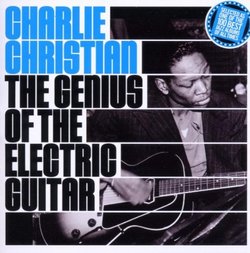Great Material!
Swing King | Cincinnati, OH USA | 02/21/2007
(5 out of 5 stars)
"Charlie Christian (1916-1941) was one of the leading jazz guitarists of his generation, comparable to other greats such as Eddie Lang, Django Reinhardt or Joe Venuti. Before Christian's untimely death in 1941 at the age of 26, his career really only lasted through the years of 1939 and 1941; this disc contains music ranging throughout this period. This is a nice sampling with excellent sound quality and musicianship.
TRACKS 1 and 2: "The Benny Goodman Sextet" recorded on October 2, 1939 and November 22, 1939 with the following personnel: Charlie Christian (electric guitar), Benny Goodman (clarinet), Lionel Hampton (vibes), Fletcher Henderson (piano), Artie Bernstein (bass) and Nick Fatool (drums).
TRACKS 3 and 4: Recorded on February 7, 1940 with the following personnel: Charlie Christian (electric guitar), Benny Goodman (clarinet), Lionel Hampton (vibes), Count Basie (piano), Artie Bernstein (bass) and Nick Fatool (drums).
TRACK 5 is the same though with Johnny Guarnieri replacing Count Basie on piano.
TRACK 6 is the same though with Dudley Brooks replacing Johnny Guarnieri on piano.
TRACKS 7 to 10: Recorded on November 7, 1940 with the following personnel: Charlie Christian (electric guitar), Cootie Williams (trumpet), Benny Goodman (clarinet), Georgie Auld (tenor sax), Count Basie (piano), Artie Bernstein (bass) and Harry Jaeger (drums).
TRACKS 11 and 12 are the same though with Jo Jones replacing Harry Jaeger on drums.
TRACK 13: "Benny Goodman and His Orchestra" recorded on March 4, 1941 with the following personnel: Charlie Christian (electric guitar), Alec Fila - Irving Goodman - Jimmy Maxwell - Cootie Williams (trumpets), Benny Goodman (clarinet), Cutty Cutshall - Lou McGarity (trombones), Gus Bivona - Skippy Martin (alto sax), Georgie Auld - Pete Mondello (tenor sax), Bob Snyder (baritone sax), Johnny Guarnieri (piano), Artie Bernstein (bass) and Dave Tough (drums).
TRACKS 14 to 16: Recorded on March 13, 1941 with the following personnel: Charlie Christian (electric guitar), Cootie Williams (trumpet on 15 and 16 only), Benny Goodman (16 only), Georgie Auld (tenor sax), Johnny Guarnieri (piano), Artie Bernstein (bass) and Dave Tough (drums).
TRACKS 17 to 19: Recorded live at Minton's Playhouse in May of 1941 with the following personnel: Charlie Christian (electric guitar), Joe Guy (trumpet), Don Byas (tenor sax), Kenny Kersey (piano), Nick Fenton (bass), Kenny Clarke (drums)."
Guitar slingers, meet your pioneer
Scott Hedegard | Fayetteville, AR USA | 12/15/2007
(5 out of 5 stars)
"Guitars were invented in Europe, or instruments similar to the modern acoustic guitar, probably hundreds of years ago. The lute, for example, is a direct ancestor, with similar tones and playing style. As for the guitar being anything but a rhythm instrument, with the exception of flamenco, what we recognize as "lead guitar", that is, melodic series of notes that highlight the instrumental portion of a song, didn't really get started until the late 19-teens, with the appearance of the first blues singers, most notably Blind Lemon Jefferson, who was among the first to play independent soloes apart from the vocals, usually in a slide-style.
Historians credit Eddie Lang, a late 1920's guitar player, with the first conventional "lead guitar", backing up Joe Venuti, a popular jazz singer of the time. Lang died tragically at an early age, and most experts agree the torch was then passed to Charlie Christian, who was the first electric lead guitar player of note, primarily with Benny Goodman, and in some live sets at Minton's jazz club that gave birth to bebop.
Before you snort at the mention of Benny Goodman, it will serve you well to hear his band. Unlike the swing bands like Glenn Miller, Goodman was a furious clarinet player and a jazz giant. His soloes were as hot as any solo on any instrument would ever be, and it would take a genius to allow Goodman to share the stage. Enter Charlie Christian.
The title of the CD is not an understatement. Christian developed the voice we all take for granted, with swooping bends, intricate scales and the spirit of rock before the genre would develop some ten or so years later. It's light years ahead of its time, much like his compatriot Django Reinhardt, and the three closing cuts that were recorded at Minton's shortly before Christian's untimely death from tuberculosis are music history. Hendrix, Atkins, and Wes Montgomery all owe a debt to Charlie Christian, and rock fans interested in hearing the first tentative steps of guitar heroism cannot miss out on this stellar collection."


 Track Listings (19) - Disc #1
Track Listings (19) - Disc #1